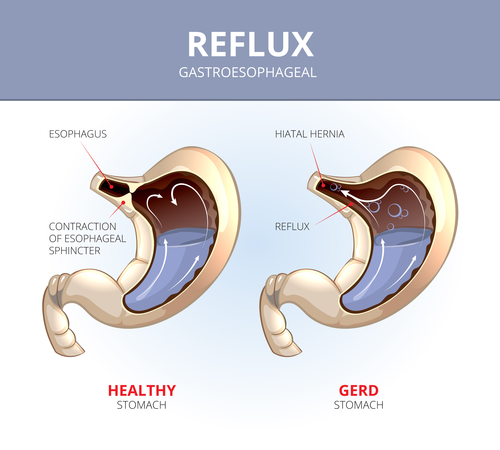Reflux, also referred to as GERD (gastroesophageal reflux disease), affects millions of people in the United States today. Its most widely known symptom is heartburn, a burning sensation in the throat or chest. But to clarify, “heartburn” has nothing to do with the heart. The problem, in fact, lies in the digestive tract.
Clearing Up the Confusion about Reflux
As we’ve shared in a previous post Reflux Disease: Helpful Measures for a Common Condition, reflux indicates digestive acid has been allowed to escape through a weakened one-way valve at the top of the stomach and travel upwards through the esophagus and into the throat. Most people suffer from an occasional bout of reflux, particularly after a large meal or lying down right after eating. But when an occasional bout turns into a regular occurrence, it may indicate a larger – yet very common – condition requiring diagnosis.
Evaluation Key to Diagnosis
A thorough discussion about your symptoms with your physician will aid in the best diagnosis and treatment. For the occasional “heartburn” sufferer, over-the-counter medications or lifestyle changes may be all that is needed. If suffering from regular, ongoing occurrences, however, your physician may suggest a physical exam and diagnostic testing to pinpoint the cause and provide diagnosis of reflux. Your physician will order testing most appropriate for your symptoms, but they can include any of the following:
- An upper gastrointestinal (GI), which produces x-rays of the digestive tract. After swallowing a barium shake, the x-ray monitors the barium dye as it moves along the tract to the stomach, capturing images of any reflux as it occurs.
- An esophageal endoscopy, which sends images of the esophagus and stomach to a video monitor enabling the surgeon to evaluate the esophagus for signs or acute or chronic damage caused by stomach acid.
- An esophageal manometry, measuring the muscle tone of the one-way valve at the top of the stomach. This is performed if your physician believes you are a candidate for surgical correction of reflux.
Dr. Robert Howard, Dr. Thomas Beetel and Dr. Joseph Levan of Spring Ridge Surgical Specialists each provide thorough evaluation and surgical treatment of reflux disease. Surgical treatment is performed at Surgical Institute of Reading, conveniently located in the same complex as the Spring Ridge Surgical Specialists practice offices. To make an appointment to see Dr. Howard, Dr. Beetel or Dr. Levan at Spring Ridge Surgical Specialists, please call 610.375.0500.

